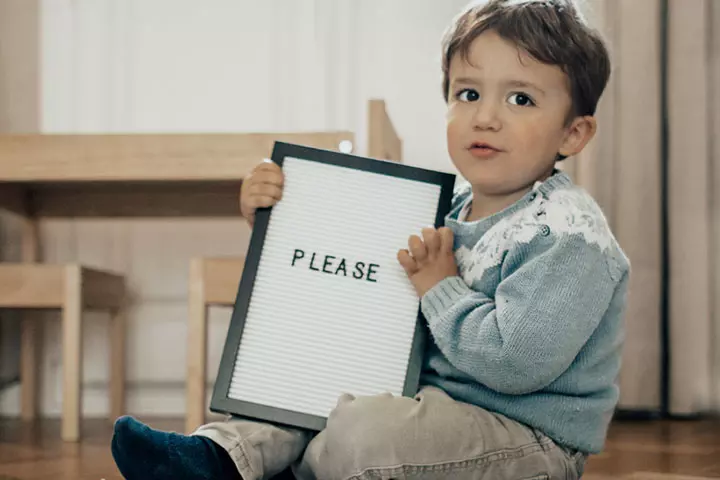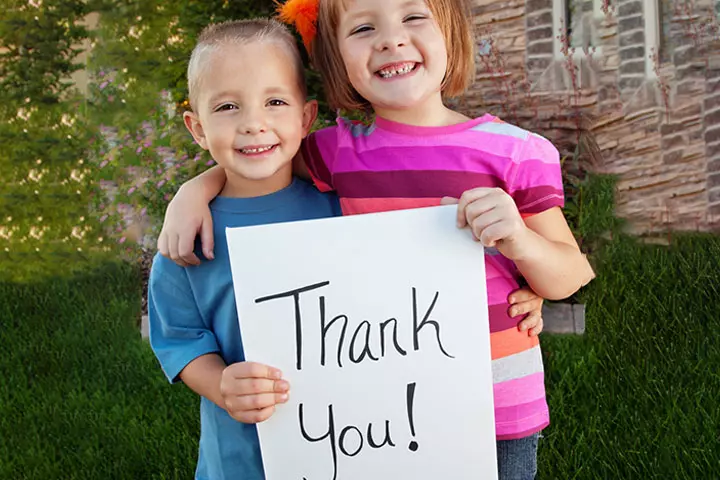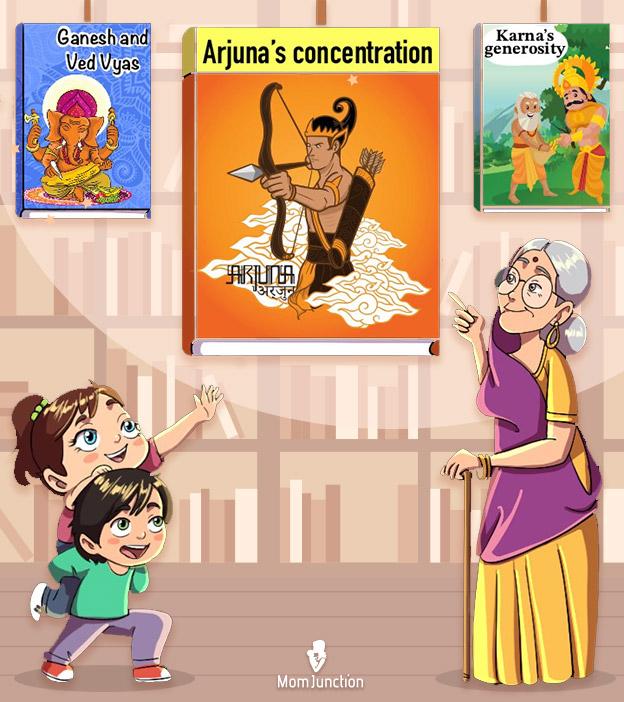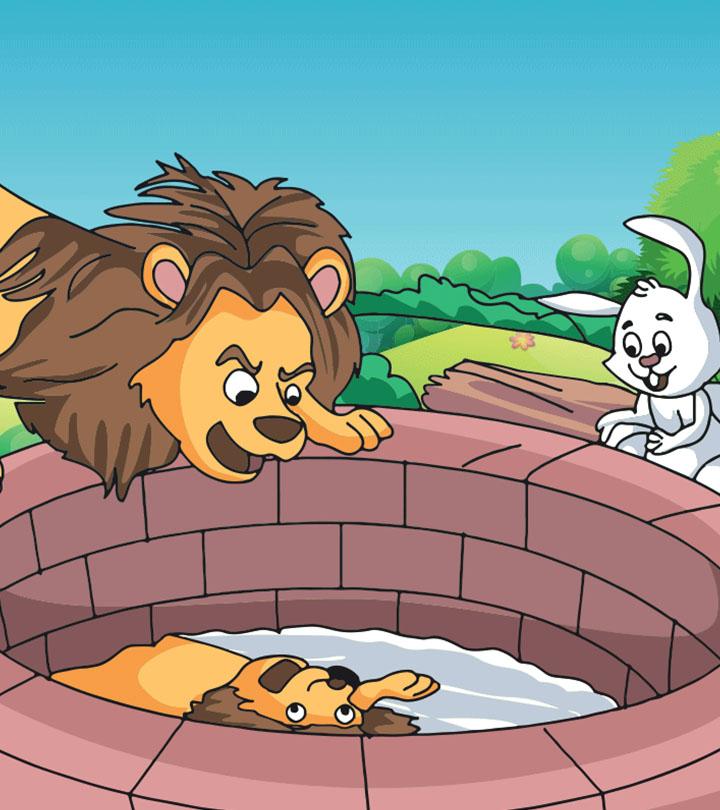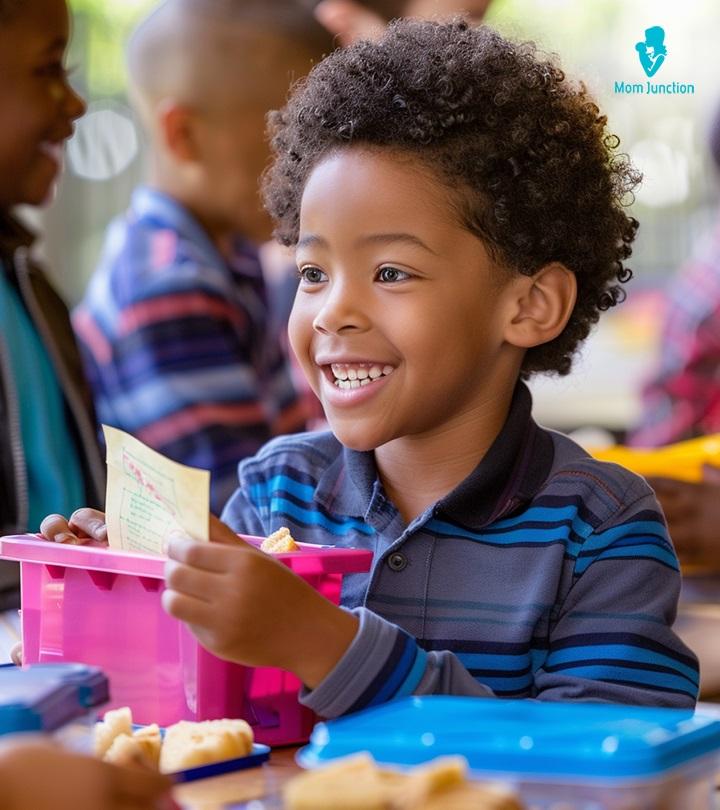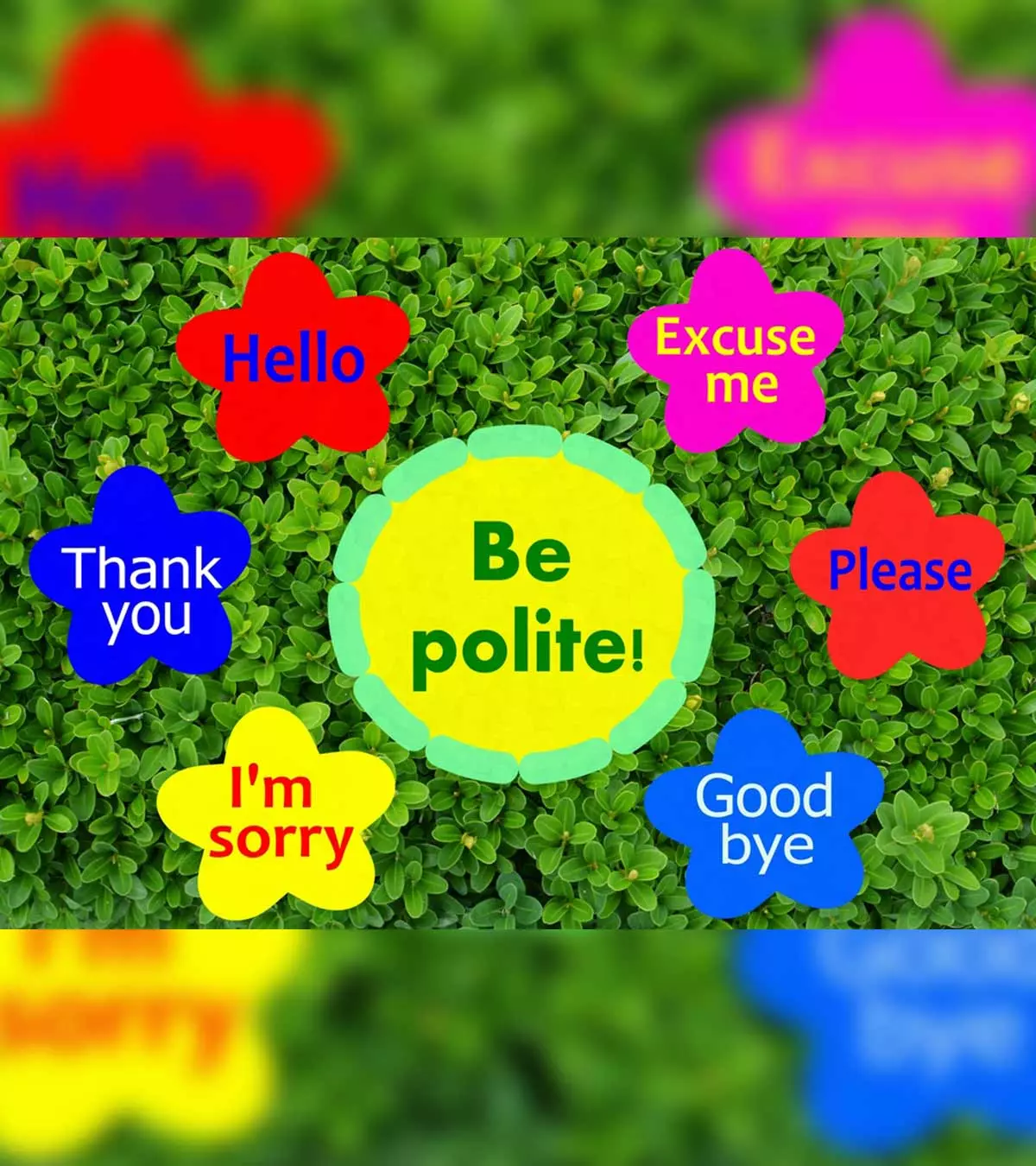
Image: Shutterstock
In the English dictionary, certain words are considered golden or magical. This post on magic words for kids will tell you some tips and tricks to use these enchanting words daily. Including magic words in your child’s vocabulary and making them practice regularly will help them converse better and improve their linguistics. Also, using them often and correctly will form an opinion of them in people’s minds. A few examples of these words include ‘thank you, ‘please,’ ‘you’re welcome,’ ‘sorry,’ and ‘excuse me.’ Inculcating the use of such magic words in your child’s conversations will impart enthralling expressions to the people conversing with them and also teach your little ones to be humble, polite, and sincere towards others. Even other children can grasp the language and improve their speaking skills. Keep reading to know more in detail and encourage your little ones to be sweeter than they are.
Why Every Child Should Learn The Magic Or Golden Words
These golden words lay the foundation of how to be polite. Of course, it takes time and continuous effort for the parent to instill good manners with these wonder-filled phrases. The following are a few reasons why every child must learn magic or golden words.
- Using joyful words to express gratitude, politeness, and kindness can spread positivity and make children more likable.
- When your child uses these magical phrases or words, it conveys to people that your child is well-behaved and polite.
- Using golden words helps build friendships. Your child would come across as friendly and approachable to people, which would help them make more friends.
- It teaches them to be grateful for every kind deed of others and reciprocate the same deeds.
- It teaches them to be respectful of their peers and elders and helps them mingle with people.
What Are The Five Golden Words For Kids?
The following are the five golden words that we should teach our children early on to make them grateful and polite.
1. Please
Image: IStock
A common word used in daily life, “please” conveys humility and respect and instantly makes your child likable. It is used to request something or a favor. Teach your child that they cannot demand anything or everything they need. Instead, whatever they want should be worthy and be available within reach, and they should learn how to ask for it politely.
Teach them delightful vocabulary like how to use “please” when they need a favor from someone. For example, “Pass me the water bottle.” sounds rude, unpleasant, and commanding. But if they add “please” to the same sentence, it totally changes the tone to a kind request, “Please pass me the water bottle.”
2. Sorry
Everyone makes mistakes. Let your child know that saying sorry when they commit a mistake or offend someone brings about forgiveness and peace. “Sorry” is a short word for an apology and has the power to heal. Let your child learn that saying sorry does not make one weak, and instead, it shows their strength of character. Encourage them to use sparkling phrases like “I apologize” or “I’m sorry for my actions” to express genuine remorse and make amends with others.
3. Thank you
Image: IStock
It is important to instill in your child the habit of expressing gratitude through charmed utterances like “thank you”. It is a polite expression that your child should use to tell someone that they are grateful for what they have given to them or done for them. Make it a habit for your child to say “thank you” for every little act of kindness that someone renders to them.
By teaching your child to say thank you, you are helping them become a grateful person. Ensure your child says “thank you” even for a service that someone renders to them in exchange for something, such as at a grocery store.
4. Excuse me
You use “excuse me” when you want to leave a place without offending someone’s feelings, request permission to interrupt someone when speaking, politely ask someone to leave space for you to pass, or apologize for something you have done unintentionally. It works wonders outside the home, especially when children need to mingle with strangers or be in large groups.
5. You’re welcome
Let children know how to use “you’re welcome” whenever someone says “thank you.” Replying to guests, friends, and relatives with a polite “you’re welcome” after they say thanks leaves a lasting impression on people. Every parent wants their children to be helpful, kind, and generous. Thus, by teaching them the use of “you’re welcome,” they inculcate the good habit of responding kindly.
Ways To Teach Magic Words To Kids
Image: Shutterstock
The following are a few ways to teach magical words to children and inculcate good manners in them. Using captivating vocabulary will help improve your child’s relationship with people around them and help build goodwill.
1. Make learning the magic words fun for your children
Ensure you adopt fun-filled strategies to teach magic words to them. For example, you could make use of songs, poems, moral stories, and games that teach good manners and convey positive thoughts.
Encourage them to use the magic words while playing with friends. This could be taught right from pre-school, where the focus is mainly on play. Engage them in playful activities and create scenarios where they can say simple dialogues that include magical words.
 Quick tip
Quick tip2. Remind them about the magic words when they forget
Image: IStock
It takes time to use magic words in basic conversation. With your help, young children can slowly inculcate the habit of using them. Whenever they forget to use the correct word, give them a hint by saying, “What about the magic words?” This will help them recall the specific word required for the situation.
3. Make the use of magic words a habit at home
Image: IStock
Using magic words becomes easy for children when you use them while performing day-to-day tasks. “Please pass me the bread,” “Excuse me, could you please pass me the jug,” “I’m sorry for changing the cartoon channel,” etc., — there are many instances where magic words can be used to address family members. Children often follow what parents do, so always make it a point to set a good example and use the magic words yourself.
Robin Koogle, a mother of a toddler, shares how she realized her daughter was adopting vocabulary from her. She admits, “I didn’t realize how much she was picking up from me. Now that I do, though, I don’t think I’ll ever instruct her to “Say please” again. In fact, I don’t want to ever tell her to say sorry, or thank you, or excuse me. It’s just not necessary. Clearly, she will repeat and imitate the interactions she is exposed to on a regular basis. She will reflect the respect and ‘manners’ that I show her. And when she does use her manners, I want it to come from a place of will, not coercion or force (i).”
4. Don’t make learning the golden words a forceful process
Never involve children in forceful learning. Stay calm and polite while talking or instructing them, and do not humiliate them if they fail to use the golden words. Some children may take time to understand and use the magic words during conversations with friends and family members.
Remind them to use the magic words often, but do not make it something compulsory. Give them enough time to develop the habit and focus on explaining things calmly, and they will soon start grasping the instructions to use the golden words.
 Point to consider
Point to consider5. Avoid bribing children excessively
Occasionally bribing children with rewards and gifts can help them want to learn more. On the other hand, constant bribing can make them dependent and demanding, and they will not obey you if they do not receive rewards for fulfilling a task or learning something new. So, use bribing as a secondary option to encourage them to learn good habits.
These are a few ways in which you could effortlessly teach the magic words to children. Besides using the golden words at home, also ensure you use them outside the home setting and show them how the use of magic words can bring people closer to us. Set a good example for your child; when they hear you saying “thank you” to the shopkeeper or someone who helped you, it will encourage your children to use the word themselves.
Image: Stable Diffusion/MomJunction Design Team
Frequently Asked Questions
1. Can magic words help children build confidence?
When children speak politely with someone, they are most likely to get a positive response. It makes conversations easy and pleasant, which can help boost their confidence.
2. How can magic words help children deal with difficult situations?
The five words are called ‘magic words’ because they indicate reverence and politeness. When a child uses these words in a tense or heated situation, it helps calm the other person and encourages them to cooperate with the child. These words can help diffuse anger and promote peace.
3. Can magic words be used in different languages?
Yes. Every language has words indicating gratitude, request, and apology. When using it, remember to use it in the language that the listener understands.
4. Can magic words help children with their emotional intelligence?
Magic words require humbleness and empathy to be used in the appropriate situation. When children practice and learn to use these words, it helps develop the emotional intelligence that enables them to gauge a situation and use the right magic word.
5. How can magic words help children with their social skills?
When a child learns how to speak to people respectfully, people like keeping their company and engaging in more conversations. This helps improve a child’s social skills.
6. How can parents reinforce the use of magic words at home?
Parents can start by using these words themselves. They can incorporate these words into daily conversations and encourage children to do the same.
Certain words, such as the magic words for kids, are more than mere words. They are a reflection of your child’s upbringing, nature, and personality. Using simple words such as ‘thank you ‘after someone offers a helping hand or ‘sorry’ after hurting someone or making a mistake will tell the other person that they are responsible and humble. Just as charity begins at home, inculcate these values in them right from their childhood in their daily life. And you will see your child turning into a respectful and kind individual.
Infographic: Why Every Child Should Learn The Magic Or Golden Words
Teaching your child the magic words and making it a habit for them to include them in their vocabulary helps them learn the flair of language. Scroll through this infographic to learn the other benefits of teaching the golden words to your children. So, read on and share them with other parents as well. Illustration: Momjunction Design Team
This fun and educational video teaches kids the importance of good manners in everyday life. Kids will learn how to be polite and respectful with this animated video.
Personal Experience: Source
MomJunction articles include first-hand experiences to provide you with better insights through real-life narratives. Here are the sources of personal accounts referenced in this article.
i. ‘Say Please’, or Not;https://medium.com/@robinkoogle/the-decision-to-not-teach-manners-to-my-children-5d739aaa0bd7
Read full bio of Dr. Holly Schiff
Read full bio of Harshita Makvana




